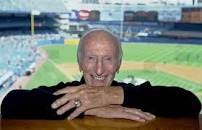A Former Football Player Named Frank Gifford Really, Really Almost Killed Me
Not intentionally, but would that have mattered?
I like to think that the Headline would have been, “Best-selling author Richmond, former football player die in blazing inferno on Grand Central Parkway.” But, of course, it’d have been “New York Giant Great Gifford Perishes in Fiery Crash.” My corpse would have made the final paragraph: “A second body was discovered, but was toasted into a burnt crust like a marshmallow you forgot you had on a stick at a campfire, and has not yet been identified; its dental records may provide a clue.”
In 2007, when we wrote a book, although he was 77 Frank always liked to think of himself as the Frank of yore, a star running back endorsing Luckies and orange juice, a gossip-column bold-face at Toots and POJ Clarke’s, sex symbol of the game when the game had few of them.
Like the day when we flew from Westchester Airport to interview a former teammate, Sam Huff, who even though Frank said Sam would show us his ranch and his horses, Sam didn’t. He have us a half hour in his office. For the flight, Frank had dressed in Beachcomber-esque jeans (c. 1966, think Annette Funicello) and sneakers without socks and a white button-down shirt with the top four buttons unbuttoned so that his old-man loose-skinned tanned chest was visible to everyone in the terminal. I wandered around as we waited for the flight rather than be seen sitting next to him.
But so anyway, on this day we’d driven to somewhere on Long Island from his house in Stamford, Ct., to interview to interview a famous Yankee Stadium announcer named Bob Shepherd (i). We’d done so in a sports car that was small, and fast, and expensive, and out of Frank’s driving league.
After our interview, Frank drove us to one of the private clubs he belonged to on the Island, for lunch. It had waiters in white jackets. And if Frank had called it after his one deeply poured chardonnay, everything would have been fine. But his second took us dangerously into the time of afternoon when traffic in eastern Queens could get ugly. It was about 4 when we left the place. Frank decided to take the Grand Central Parkway East to the Clearview North to the Throgs Neck.
Frank didn’t know the Island’s roads like I did. if you could tell Frank anything, I would have told him to be careful when the GCE was getting close to the Clearview because it could easily be backed up, but you couldn’t tell Frank things, so I didn’t. Instead I asked him if he could clarify the years that Bob Shepherd had been the Giants’ announcer.
Frank didn’t work for the Giants, but he liked to think that he was on the inside, so he said he’d give a call to someone at the Giants’ office, punched a number into his phone while steering at 70, got a recording and flicked his visor down and began to speak I guess into a speaker requesting said info.
He was looking up at the visor as he spoke, as if it couldn’t hear him if he spoke while he was looking at the road, which he wasn’t when, him I saw that, yep, traffic ahead was at a standstill. We were doomed. I yelled “FRANKFRANKFRANK!!!” as loudly as I’d ever yelled anything, because the prospect of an imminent crashy death gives extra strength to your lungs. It was all so quick I didn’t have time to consider what dying might entail at this point in my life.
Frank slammed on the brakes, but it wasn’t going to work, not at this speed, but thanks to the sophisticated steering mechanism of his car, he was able to swivel at the last second onto the shoulder, missing the car ahead of us by a miraculous micro-inch. We shuddered to a stop in a cloud of burnt rubber and sudden silence.
I didn’t say anything, because that wasn’t my role. He didn’t say anything either, just pulled back onto the GCP. We inched to the Clearview, and eventually made it over the Throgs Neck. Back at his house I got into my car to drive home. We confirmed our next interview, a few days later which was on the phone with Rosey Grier, who said, “Frank, we never liked you much,” sort of in jest. Frank didn’t laugh. I chatted with Rosey about being Ethel Kennedy’s bodyguard on that night at The Ambassador. He said that even though security had worked out Bobby’s exit, at the last minute a hotel employee said that he should take a short cut through the kitchen. Rosey didn’t like the sound of it, but his job was to guard Ethel.
Because Frank’s wife Kathy Lee Gifford pumped the book on TV, it became a best-seller. One day at his house, with Frank elsewhere, I asked Kathy Lee if she’d considered the age difference when they married. She said, with a very straight face, that she hadn’t then, but sometimes did now. She was writing a musical about the spiritualist Mary Baker Eddie in longhand in pencil on a yellow legal pad.
(i) Shepherd was the most famous football announcer in the land, but never reaped any fame. His house was a tiny tract house where he lived with his wife of, like, 135 years, and they were the two happiest people I ever met.
‘








The Glory Game was a great read for an old Giant fan until the 4th quarter. Peter wish you could have rewritten history and convinced Jim Lee Howell to go for the 4th and one on the Giants final drive. But Jim Lee was no Don Shula or even Weeb Eubank.